Four Iranian Prisoners Die Under Mysterious Circumstances
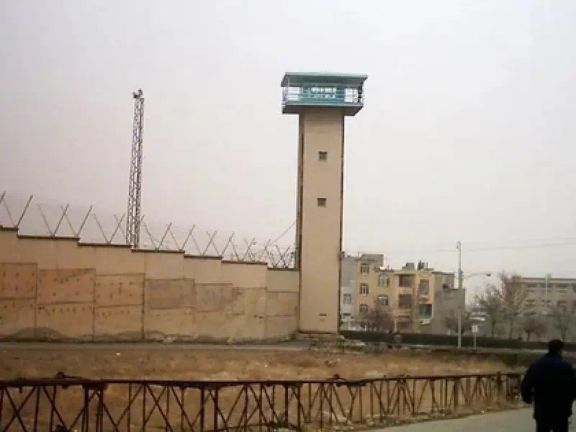
Four Iranian prisoners died under unclear circumstances at Sheiban Prison in the southern city of Ahvaz, while fifteen others were transferred to hospital.

Four Iranian prisoners died under unclear circumstances at Sheiban Prison in the southern city of Ahvaz, while fifteen others were transferred to hospital.
The incident occurred in ward three, a section housing inmates charged with theft and drug-related offenses, Karoon human rights organization reported Monday.
Reports suggest that the deaths may have been caused by incorrect medication, leading to potential poisoning, although the claims have not yet been confirmed.
The report has sparked outrage and demands for a transparent and independent investigation into the mysterious deaths from prisoners' families and human rights advocates.
This incident further tarnishes Iran's already contentious human rights record, particularly regarding drug offenses. A recent report by Amnesty International revealed a disturbing rise in executions for such crimes, with over half of Iran's 853 executions in 2023 linked to drugs.
The increase in executions has not only caused domestic upheaval but has also drawn international criticism. In his November 2023 address to the United Nations General Assembly, UN Secretary-General Antonio Guterres described the rise in executions in Iran as “alarming.”

Even without trusting government-controlled election figures over the years, turnout has steadily decreased in Iran. The rulers of the Islamic Republic cannot deny the statistics from their own Ministry of Interior.
This decrease in participation has numerous economic, political, and social causes. Chief among them are livelihood difficulties, declining purchasing power, and increasing poverty and unemployment, which leave most Iranians with little incentive to vote. The current state of the country affects over 90% of the population, contributing to a broader social context for this decline in voter turnout.
Schism between the Islamic government and the people
Over the last fifteen years, particularly after the 2009 crackdown on the Green Movement and the "Where Is My Vote?" protests, the masses have distanced themselves from the government in large numbers. This growing divide is evident in the differing lifestyles of the people compared to their rulers, the process of de-ideologization, the increasing belief in the separation of religion and state, the rising use of non-governmental media, and the sexual revolution in society. The government's plan to engineer people's lives based on its Islamist ideology through the education system and by reducing culture, art, sports, and media to government propaganda has failed.
National memory exists
According to government officials, Iranians quickly forget repressions. Hassan Rouhani's advisor, Hesamoddin Ashna, once remarked, "Our sweet people are hard to conquer but easy to reconcile." Similarly, the Minister of Communications under the Raisi administration dismissed complaints about the killings of thousands of protesters in 2017, 2019, and 2022 as mere grumblings, urging people to forget them and vote. Mohammad Reza Aref, Khatami's former VP, also advised not to "tie Iran's future to hatred of the past" to encourage voter turnout.
Contrary to these expectations, Iranian society neither wants to nor can forget the recent repressions. The motto of those who have lost loved ones or been injured, shared by the majority, is "we do not forgive, and we do not forget." As a result, calls from reformists to forget have largely been ignored. The Iranian people are developing a strong political memory and cannot simply move on. It's unrealistic to think they will reconcile with the system just because Pezeshkian is brought into the picture.
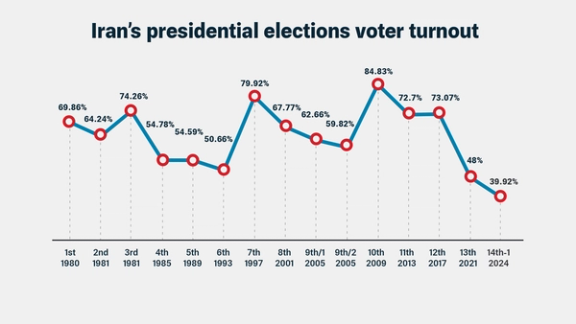
Change of reference groups
In the past decades, intellectuals, clerics, and academics were considered influential reference groups in Iran, with a significant portion of the population following their guidance. However, this changed in 2017. Despite opposition from these groups that year, people rose against the regime in more than 100 cities and small towns. Since then, three other groups have gained more influence on society: the families of slain protesters, political prisoners, and union and civic groups. In the 2024 elections, these three groups effectively boycotted the elections, and their boycott had a significant impact.
While celebrities, public figures loyal to the regime, and former and current officials turned some main polling stations in Tehran into social gatherings on June 28, portraying themselves as elites on voting day, the people advised by the new reference groups stayed at home. Government agents often accompany foreign journalists to these central polling stations to create an impression of higher turnout. Consequently, domestic and foreign journalists obtained most of their photos and reports from these locations.
Non-participation has no gender, class, or ethnicity
The non-participation or boycott by the majority of voters, officially reported at 60% last week, cannot be attributed solely to the abstention of women, ethnic groups (Kurds, Baluchs, Arabs), and the poor. This widespread decision to abstain and show resentment towards the government is a cross-class, cross-gender, and cross-ethnic phenomenon. The majority of Iranians do not see a light at the end of tunnel for their future if the Islamist government remains in place.
The participation of Kurds and Baluchis has decreased similarly to others, and the deprived classes have distanced themselves from the ballot boxes in the same manner as the prosperous classes. "No Vote at All" was a national campaign.

At least 10 Iranian Kurdish Kolbars, or cross-border porters, were killed or injured on the Iraqi border in June, with 90% of the incidents resulting from direct fire by Iranian border guards.
Three Kolbars were killed and seven were injured as reported by the Hengaw Human Rights Organization on Sunday, with two of the deaths caused by direct fire from border patrol forces.
The majority of the incidents, 8 out of the 10 cases, were reported along the borders of Iran’s Kordestan Province.
Kolbars often carry smuggled goods on their backs across Iran’s borders, journeying long distances through mountainous regions into Iraq as an attempt to escape the dire conditions they live in. They carry household appliances and similar merchandise restricted by Iran's stringent import processes.
According to Kolbar News, from March 2023 to March 2024, 444 Kolbars were killed or injured along the border areas and interprovincial routes between West Azarbaijan, Kordestan, and Kermanshah provinces. Such incidents were caused by various factors, including direct shootings by military forces, avalanches, frostbite, stepping on mines, and falls from mountains and heights.
Direct shootings by military forces accounted for 373 of the 444 casualties. Often, Kolbars are involved in smuggling goods such as illegal fuel in some of Iran's poorest provinces, and many of them are under the age of 18.
The Iranian government's treatment of the laborers underscores the realities faced by those struggling to survive in one of the country's most marginalized communities.
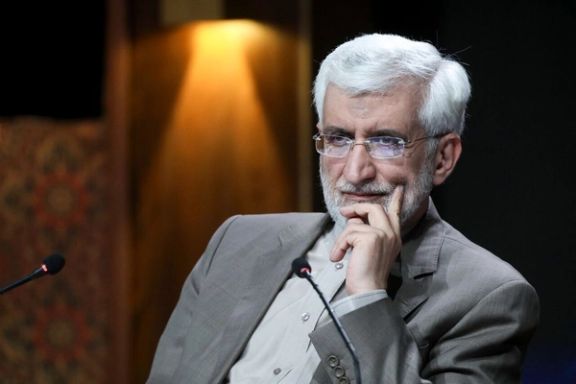
Politicians close to Iran's 'reformists' have begun warning voters about hardliner presidential candidate Saeed Jalili, as they argue that his ideological rigidity will hurt the country.
Hamid Abutalebi, former advisor to ‘reformist’ Iranian President, Hassan Rouhani took to X to warn against Jalili labeling him as a ‘fanatical extremist’ who he has known for “more than 3 decades.” whose policies would increase chances of conflict with the West and intensified sanctions.
Reformists including Abutalebi insist that Jalili is a danger to the country with his hardline foreign policy and ideology.
"Trump has pledged to bring back the sanctions in a paralyzing form if he wins," Abutalebi stated, "Jalili has also said in the debates that if he wins, he wants to make the West regret the sanctions. Therefore, if Mr. Jalili and his faction are elected, not only will there be no negotiation to solve the people's problems,” Abutalebi warned.
Although Abutalebi says that he didn’t vote in the elections, he stated that he believes presidential candidate Masoud Pezeshkian’s commitment to his “reformist policies will not bring the country to the valley of destruction.”
A large majority of voters who boycotted the first round of the election on June 28, were not swayed by the mutual smearing campaigns of the reformists and hardliners.
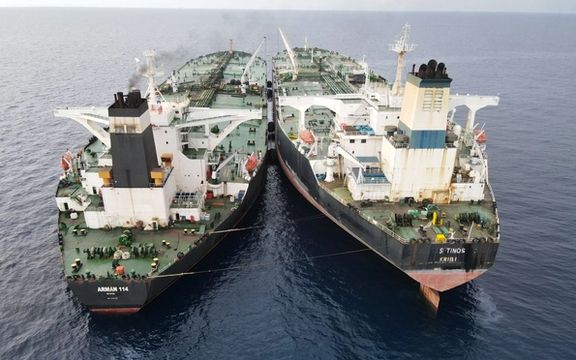
Iran’s crude oil and gas condensate exports surged to 1.7 million barrels per day (mb/d) in May, hitting a 5-year high point, since the imposition of full US sanctions in May 2019.
The country’s oil and gas condensate exports reached 1.65 mb/d in the first five months of 2024, according to oil analytics firm Vortexa, as the Middle East experienced its worst violence in decades, triggered by the October 7 attack on Israel.
Iran’s custom statistics also indicate increasing oil revenues by 34.8% year-on-year to $12 billion during the first three months of current Iranian fiscal year, started March 21.
According to the data intelligence firm, Kpler, Iran exported 1.194 mb/d of crude oil and gas condensate in spring 2023. Therefore, the country’s oil export increased 30% in the second quarter of 2024, while oil prices in international markets also rose about 7% during the mentioned period.
Iran had also about 240,000 barrels per day of mazut exports, remained almost unchanged year-on-year.
Vortexa says that an increase in Iran’s crude production, higher demand from China and a net increase in the size of Islamic Republic’s dark fleet have helped facilitate its oil export growth.
The United Against Nuclear Iran (UANI) has identified 383 vessels suspected to be part of a clandestine “ghost fleet.” So-called ghost ships are vessels that disguise their ownership and movements in order to facilitate breaches of sanctions.
Considering Iran's export volumes of oil, gas condensate, and mazut, along with higher prices in the international oil markets, the country’s revenues should have exceeded $14.5 billion in spring 2024. However, it only garnered $12 billion.
The 20% shortfall indicates Iran’s lower selling price to secure buyers who take a risk in the face of US sanctions. Chinese refineries are the main buyers of Iran’s illicit oil shipments that middlemen mix with cargos from other countries and unload in China as imports from Singapore and other sources.
Devaluation crisis
Despite 18.6% growth in oil and non-oil export revenues and only 1.4% increase in imports, Iran’s national currency, rial, has remained near its all-time lows after a 15-fold depreciation since 2018. The rial has been trading around 600,000 per US dollar for weeks, while in early 2018 it stood at around 40,000 to the dollar.
The ongoing presidential race had hurt the rial more. The prospect of Saeed Jalili, an ultra-hardliner winning the race in Iran's July 5 runoff, pushed Iranian currency down to around 620,000 per dollar since the result the first round of voting on June 28.
The snap election was called after former President Ebrahim Raisi and his entourage died in a mysterious helicopter crash in May.
During Raisi’s 3- year presidency, the rial has lost about 65% of its value despite ever-increasing oil exports. Inflation rose to almost 50% as prices of essential commodities such as food increased at even a faster pace. With every drop in the value of rial imports become more expensive and fuel higher inflation, and public dissatisfaction.
Already, market watchers in Iran complain of foreign currency shortages for importers of consumer and industrial goods. It is unclear why with more oil exports the country suffers from a lack of hard currencies. One explanation is that China does not necessarily pay cash for the oil and offers barter to Iran.
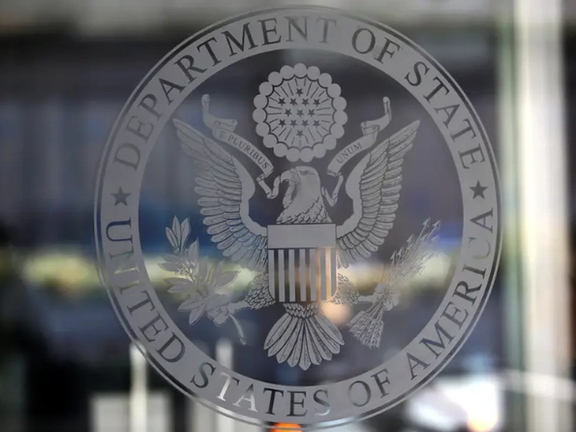
Iran’s elections are not 'free and fair,' the US State Department told Iran International on Sunday, in its first comments on the results of Friday's votes that led to a runoff between a moderate and a hardline candidate.
The June 28 presidential election marked the lowest voter turnout in the history of the Islamic Republic, with only 39.92 percent participation. This breaks the previous record set during the last election, in which the late President Ebrahim Raisi won with a turnout of 48 percent.
"The elections in Iran are not free and fair," a State Department spokesperson said.
"Unfortunately, we have no expectation that these elections, whatever the outcome, will lead to fundamental change in Iran’s direction or more respect by the Iranian regime for the human rights of Iran’s citizens," the spokesperson added, as the Iranian government prepares for a runoff presidential election slated for July 5.
Biden administration's Acting Special Envoy for Iran Abram Paley said two days before the Iranian elections that and candidates are handpicked by the Guardian Council, and voters lack access to the “most basic freedoms; necessary features of any democracy."
"In the face of the authoritarian regime’s long history of harassing and intimidating journalists, suppressing election coverage, and denying freedom of peaceful of assembly, we support the Iranian people," he said on his X account.
Iranian candidates are vetted before they can stand for election. The 12-member Guardian Council, whose members are appointed or recommended by Supreme Leader Ali Khamenei, disqualifies anyone deemed insufficiently loyal to the system.
The vetting process leaves voters with no real choice. Many Iranians seem indifferent to the vetting process itself, having lost faith in the system’s willingness or ability to change through elections.
Activists and officials have highlighted that the low turnout in Iran's June 28 votes is a clear sign of the public's discontent with the ruling autocracy, demonstrated through the widespread boycott of the election.
In 2021, voter turnout was 48 percent, the lowest for any presidential election in Iran's history. This year, turnout has dropped further to less than 40 percent, marking an unprecedented trend since the Islamic Republic's establishment in 1979. Additionally, the 2021 election saw the highest percentage of void and blank votes ever recorded, accounting for 13 percent of all ballots cast.
The record-low voter turnout is a significant blow to Iran’s Supreme Leader, Ali Khamenei, who had repeatedly called for a high turnout in the election.
“We place great importance on high participation because the most significant effect of high participation is the honor of the Islamic Republic,” Khamenei stated in a speech on Tuesday, calling high voter turnout "crucial" for the Islamic Republic's survival.
While the official voter turnout of 39.92% announced by Iran's Interior Ministry is already a stark indicator of voter apathy among the population, many Iranians are now expressing suspicions that the Islamic Republic might be inflating these already low turnout figures.
A recent analysis by United Against Nuclear Iran (UANI) said that a covert arm of the Islamic Revolutionary Guard (IRGC) has been rigging elections and manipulating Iran's political landscape through a clandestine network of cultural and political operations.
Known as the Baqiatallah Headquarters, this apparatus works closely with the Intelligence Ministry to strategically influence the current snap election to replace former President Ebrahim Raisi, the NGO reports.